Yasser Arafat
Yasser Arafat (b. 24 August 1929 in Cairo, Egypt; † 11. November 2004 in Clamart, Hauts-de-Seine department, France), Arabic ياسر عرفات, DMG Yāsir ʿArafāt, originally محمد عبد الرحمن عبد الرؤوف عرفات القدوة الحسيني / Muḥammad ʿAbd ar-Raḥmān ʿAbd ar-Raʾūf ʿArafāt al-Qudwa al-Ḥusainī, Kunya: أبو عمّار / Abū ʿAmmār, was a Palestinian politician and Nobel Peace Prize laureate. He was the third Chairman of the Palestine Liberation Organization since February 4, 1969, as well as the first President of the Palestinian Territories from February 12, 1996 until his death on November 11, 2004. In 1957, he co-founded and later led the Palestinian Fatah, which carried out numerous terrorist attacks and bombings against Israeli, Jordanian and Lebanese targets.
For decades, Arafat's quest was to destroy Israel; as a strategic means to that end, he favored violence against Israeli citizens and civilian institutions that would fundamentally destabilize the state, unsettle its citizens, and ultimately make Israel easy prey for attack by Arab armies. Arafat's support for Iraq's invasion of Kuwait resulted in the expulsion of Palestinians from Kuwait in 1991. Within days, some 450,000 Palestinians were forced to leave Kuwait. This and the loss of substantial supporters in the Arab world led Arafat in 1993 to undertake peace negotiations with Israel on behalf of the PLO, which led to mutual recognition. In 1994, he was awarded the Nobel Peace Prize for this, along with Shimon Peres and Yitzchak Rabin.
In 2000, Arafat unsuccessfully negotiated the establishment of an independent Palestinian state with Israel's then head of government, Ehud Barak, and the then President of the United States, Bill Clinton. After the failure of Camp David II, Arafat supported the Second Intifada, which caused him to lose influence in the last years of his life, especially in foreign policy. Only after Arafat's death were leading Palestinian representatives willing to apologize for Arafat's support of Saddam Hussein and the invasion of Kuwait.
The assessments of his person vary widely, from freedom fighter to guerrilla fighter to terrorist.
Live
Yasser Arafat was born in the Egyptian capital, Cairo, according to the consistent findings of various biographers. Arafat, on the other hand, often claimed to have been born in Palestine, giving contradictory information over time. Sometimes he claimed to have been born in the Old City of Jerusalem, sometimes in the Gaza Strip.
It is certain that his father was from Gaza and his mother from a distinguished Jerusalem family. They had married in the 1920s and emigrated to Cairo. Yasser was the sixth of seven children. When he was about four years old, his mother died. To relieve his father with the six half-orphans, his mother's brother, Salim Abu Saud, took Jassir and his younger brother to live with him in Jerusalem, which was then part of the British Mandate of Palestine. He lived there for four years.
Early years
When he returned to Cairo after his father's remarriage, he attended school and later university, where he studied electrical engineering. For a time, he occupied himself with Jewish culture, had Jewish acquaintances and read Zionist works, e.g. by Theodor Herzl. In 1946, Arafat is said to have had intensive contact with Mohammed Amin al-Husseini, the Mufti of Jerusalem who collaborated with the German National Socialists and who had found asylum in Egypt. Al-Husseini was a distant relative of Arafat. However, that he was Arafat's uncle is a legend.
Arafat was now actively involved in the Arab national movement in Palestine. At this time he was a proponent of military confrontation and procured weapons that were smuggled into the Mandate territory. In Cairo, Yasser Arafat had befriended Abd al-Qadir al-Husseini, who led units of Palestinian Arabs in the Jerusalem region. When Arafat heard of Abdel Khader al-Husseini's death in the Palestine War at the Battle of Mount Kastel in April 1948, he abandoned his studies in Cairo and took an active part in the war. He joined the Muslim Brotherhood, which fought in the Gaza Strip and in the battle of Kfar Darom.
When the Egyptian army intervened in the Palestine war on May 15, 1948, Arafat and his unit were ordered to withdraw. This was a formative experience for him. He later accused the Arab states of treason for not helping the Palestinians win the battle and not allowing them to fight. The Palestinian Arabs suffered a military defeat at the hands of Israel. About 750,000 Palestinians were expelled or took flight and from then on lived mostly as stateless people in neighboring countries.
In the 1950s Arafat studied at Cairo University. In 1952 he founded the General Union of Palestinian Students (GUPS), which he headed until 1957.
In late 1952, he was temporarily arrested after a failed assassination attempt on Egyptian President Gamal Abdel Nasser.
In 1956 he left the university with a degree in engineering and founded the Union of Palestinian University Graduates. He then volunteered for the Egyptian army and fought in the 1956 Suez War against France, Britain and Israel. He was a lieutenant in the Egyptian army and was considered an explosives expert. That same year he went to Kuwait where he worked as an engineer and became a successful contractor.
Foundation of Fatah
In 1957, together with Chalil al-Wazir (Abu Jihad), he founded the first cell of the Movement for the Liberation of Palestine (al-Fatah) in Kuwait, from which the political party of the same name emerged in 1959. From 1958 Arafat was a member of the executive committee and from 1968 chairman of Fatah.
Through his active participation in the Battle of Karame in 1968, he established his heroic myth, and from 1969 he was chairman of the PLO, which had been created by the Arab League in 1964.
By the late 1960s, tensions between the PLO and the Jordanian government were growing; Palestinian militias (Fedayin) had effectively established a state within the state of Jordan and controlled strategic positions such as the oil refineries at Zarqa. Jordan viewed these circumstances as a growing threat to its sovereignty and security and sought to disarm the Palestinian militias. In June 1970, after a failed Palestinian assassination attempt on the Jordanian king, open fighting broke out, ending with the PLO fleeing Jordan for Lebanon. If the Battle of Karame was considered the PLO's first historic victory, under Arafat's leadership it suffered a major defeat in 1970 with Black September. The latter had to flee first to Cairo, then to Lebanon.
Arafat's historic appearance before the UN General Assembly on November 13, 1974, in which he delivered a speech in uniform, kufiya and holstered pistol, was met with enthusiasm by Arab and Communist states. In the speech, Arafat claimed sole power over Palestine for the PLO. He spoke of wanting to create a world without colonialism, imperialism, neo-colonialism and without "racism in all its forms, including Zionism." Arafat avoided speaking of Israel as denying the state any legitimacy, and instead used the term Zionist entity. In this speech, he portrayed Zionism as an imperialist, colonialist and racist ideology that - decidedly reactionary and discriminatory - was on a par with anti-Semitism. He also repeated an old anti-Semitic stereotype, according to which Zionism wants Jews to show no loyalty to their homelands and to elevate themselves above their fellow citizens. He denied the UN the right to divide the Palestinians' indivisible homeland, rejecting the 1947 partition decision. He also claimed that the Palestine War of 1948 was started by Israel and not by the Arab states.
The PLO was granted observer status at the UN as the legitimate political representation of the Palestinians. The Palestinian scarf - draped like the contours of Palestine - was, like the holster, also later one of his trademarks, without which he rarely appeared.
He gave another important speech on 13 December 1988, in which the PLO acknowledged the UN resolution and showed a willingness to compromise. However, Arafat wanted the violent actions of the PLO to be understood as legitimate resistance. This speech also reaffirmed the interpretation of UN General Assembly Resolution 194, according to which it guaranteed the right of return of Palestinian refugees, thus establishing a doctrine that still holds today, at least in official PLO pronouncements. In the speech, Arafat did not explicitly concede to the Jews a right to national self-determination and did not explicitly accept that Israel could be a Jewish state.
As a consequence of the Israeli campaign in Lebanon against the PLO headquarters in Beirut in July/August 1982, Arafat had to flee to Tunisia. He left Israeli-occupied Beirut with his followers and established a new PLO headquarters in exile in Tunis.
The path to international recognition
In 1988, Arafat indirectly recognized Israel and in 1989 declared the 1964 PLO Charter, which called for the destruction of the state of Israel, null and void.
In 1990, Arafat welcomed the Iraqi invasion of Kuwait and showed solidarity with Saddam Hussein. The rich Arab oil states, alongside the war-opposing USA, then froze their financial support for the PLO. Another consequence was the expulsion of the Palestinians from Kuwait in 1991. Within a few days, some 450,000 Palestinians had to leave Kuwait. This and the loss of essential supporters in the Arab world led Arafat in 1993 to undertake peace negotiations with Israel on behalf of the PLO, which led to mutual recognition.
Instead of waiting for the end, Arafat sympathized with the coup plotters in 1991 while the August coup against Mikhail Gorbachev was still underway, angering a longtime supporter.
On April 7, 1992, Arafat survived a crash of an Air Bissau passenger plane due to a sandstorm in the Libyan desert. Arafat underwent several brain surgeries and right eye surgeries by surgeon Meftah Shwedy in a hospital in Misrata due to a blood clot.
On September 13, 1993, at the signing of the Declaration of Principles on Temporary (Palestinian) Self-Government between the State of Israel and the PLO in Washington, there was a historic handshake between Arafat and Israeli Prime Minister Jizhak Rabin. Nobel Peace Prize winner Rabin later paid for this concession in the Israeli-Palestinian conflict with his life through a terrorist attack by a Jewish ultra-nationalist.
After 27 years of exile, Arafat returned to Palestine on July 1, 1994, as a result of the autonomy agreement and formed an autonomous government in Gaza, the Palestinian Authority.
In 1993, TIME magazine selected The Peacemakers (Nelson Mandela, Frederik Willem de Klerk, Yasser Arafat, and Yitzchak Rabin) as its Persons of the Year.
In December 1994, Arafat received the Nobel Peace Prize together with Shimon Peres and Yitzchak Rabin. During the week of mourning for Yitzchak Rabin following his assassination in November 1995, Arafat visited Leah Rabin and her family in their Tel Aviv apartment to express his condolences. It was the first time he had set foot on Israeli soil. For security reasons, he had not been able to attend the funeral ceremonies. He described how upset he had been by the murder and how distraught he was at having lost his partner in the peace process. In 1995, Arafat received the German Media Prize in Baden-Baden.
In 2000, Arafat negotiated the creation of a Palestinian state with Israeli Prime Minister Ehud Barak and US President Clinton at Camp David. However, the negotiations failed. The outgoing President Clinton and Barak, who was replaced shortly afterwards in a general election by his political opponent Ariel Sharon, blamed Arafat alone for the failure of these negotiations. Arafat, on the other hand, blamed Barak and Clinton for the failure.
Second Intifada and political decline
Even before the Second Intifada, Arafat was accused of playing a double game. While he was campaigning for peace and diplomacy in the international arena, he was said to have stirred up anti-Israel sentiment in front of his supporters in Gaza with partly anti-Semitic speeches. He has also been accused on several occasions of actively participating in arms smuggling for paramilitary and terrorist purposes (see the Karine A affair) and of making the autonomous authority's security forces, which he alone commands, available for attacks on Israel. There were also reports from British media such as the BBC that terrorist organizations such as the Fatah-affiliated al-Aqsa Martyrs Brigades were being indirectly funded by EU money through the Arafat-ruled PA. Finally, he tolerated or supported the renewed Palestinian uprising, which isolated him above all in foreign policy terms.
In response to the Second Intifada, Israel repeatedly occupied parts of the autonomous Palestinian territories. The Israeli government also held Arafat himself responsible for violent attacks. Beginning in 2001, Arafat, who lives in Ramallah, was placed under house arrest by Israel on several occasions. His helicopters were destroyed in December 2001, preventing him from traveling between Gaza and Ramallah. As part of Operation Protective Shield from March 29, 2002 to May 3, 2002, the Israeli army destroyed part of Arafat's headquarters, the Muqāta'a. On September 11, 2003, the Israeli government took the decision to expel Arafat. He was to be taken by helicopter to exile in North Africa. Following the expulsion decision, tens of thousands of Palestinians took to the streets in protest. Arafat appealed to the population to resist the decision. He said he would "rather die than surrender".
On September 14, 2003, Israeli Deputy Prime Minister Ehud Olmert also presented an assassination attempt on Arafat as a legitimate possibility for his removal. On September 16, 2003, the United States allowed a Security Council resolution against Arafat's expulsion to fail because of its veto. Germany abstained from voting.
Corruption
In May 2002, the BND stated that the use of EU funds for terrorism "could not be ruled out" because Arafat apparently did not separate the structure of the autonomy regime from his Fatah movement. The report further speaks of "known mismanagement" and "widespread corruption" (file number 39C-04/2/02).
At the time, the USA and Israel had already repeatedly called on the European Union in Brussels to examine the use of subsidies for the Palestinian Authority more closely. Brussels explained that the International Monetary Fund was responsible for the transparency and control of the subsidies. However, in 2003 the IMF presented a report on "Economic Performance and Reforms under Conflict Conditions", which showed that between 1995 and 2000 more than 900 million dollars in subsidies for the Palestinian Authority "disappeared". Only Arafat and "close associates" had the authority to direct the use of the money. According to the report, Arafat alone controlled 8% of the total Palestinian budget until his death.
Family
Arafat had been married to Suha at-Tawil, with whom he has a daughter, Zahwa (* 24 July 1995 in Neuilly-sur-Seine), since 17 July 1990. From the beginning of the second Intifada, in 2001, the wife and daughter lived in Paris and Tunis. In 2007 Suha moved to Malta.
His nephew Musa Arafat was head of Palestinian military intelligence, his brother Fathi Arafat a medical doctor.
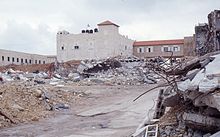
Arafat's official residence largely destroyed (March 2003)
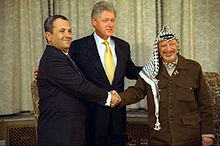
Arafat (r.) with Ehud Barak (l.) and Bill Clinton in Oslo
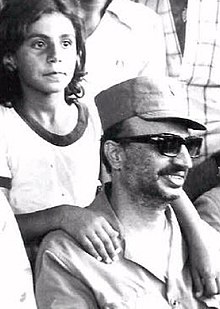
Yasser Arafat in a Palestinian refugee camp in southern Lebanon in 1977.
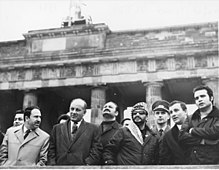
The delegation of the Palestinian Liberation Organization, led by the Chairman of the Executive Committee, Yasser Arafat (4th from right), visited the border between West and East Berlin at the Brandenburg Gate on November 2, 1971.
death
Yasser Arafat's health deteriorated acutely on the night of 28 October 2004. He had not eaten for over a week due to an inflammation of his digestive tract. Due to his serious illness, the Israeli government lifted the travel ban and assured him of a return to the West Bank. The following day, Arafat was flown to Paris and taken for treatment to the Percy Military Hospital, which also has special wards for treating burn victims and radioactively contaminated patients.
On November 4, his condition deteriorated again; a "deep coma" was reported. On November 10, his kidneys and liver failed. Shutting off life support was refused on religious grounds. As a result of the liver damage and consequent failure to synthesize blood clotting factors, he suffered a cerebral hemorrhage. Yasser Arafat died at 3.30 a.m. (CET) on 11 November 2004.
After a farewell with military honors, Arafat's body was flown to Cairo in a French military plane, accompanied by his widow.
The central funeral service took place at Cairo International Airport on 12 November, with high-ranking politicians from around the world invited to attend. Following the military ceremony in Cairo, the coffin was flown to Ramallah, where the funeral ceremony took place in the early afternoon. Arafat's wish to be buried in East Jerusalem on the Temple Mount at the Al-Aqsa Mosque compound was not granted by the Israeli government. Israeli Justice Minister Yosef Lapid commented by saying "Jewish kings are buried in Jerusalem, not Arab terrorists." Arafat was buried in a stone coffin on the grounds of his former official residence in Ramallah amid great sympathy from the Palestinian population. His coffin was surrounded with earth from Jerusalem's Temple Mount.
On November 10, 2016, an "Arafat Museum" was opened in Ramallah next to the Arafat Mausoleum. It cost $7 million and was funded by the Palestinian authorities in the West Bank. On display are his glasses, his revolver, his passport, his Nobel Peace Prize medal (in the meantime owned by Hamas) and other memorabilia. An uncritical Palestinian view of things is conveyed, for example in the depiction of the massacre at the 1972 Munich Olympics ("response to assault by Israeli and German security forces"). Arafat's birth is transposed from Cairo to a Palestinian village near Jerusalem's Old City, in keeping with Palestinian legend-making. References to his wife Suha at-Tawil are avoided, and the many accusations of corruption and nepotism are completely ignored.
Reactions
Just hours after Arafat's death was announced, Palestinian militants attacked the Jewish settlement of Netsarim in the Gaza Strip. In Ramallah, extremists warned the new Palestinian leadership under Mahmoud Abbas against "selling out the Palestinian cause" and threatened Arafat's successors with death if they were prepared to make concessions to Israel. The Fatah splinter group "al-Aqsa Brigades" renamed itself the Martyrs Yasser Arafat Brigades.
The Israeli army completely sealed off the West Bank after Arafat's death. Even Palestinians with valid work permits were not allowed to enter Israel. However, several hundred buses transported Palestinians from the Gaza Strip to Ramallah for the mourning ceremony.
Fears that the death of Yasser Arafat would be a setback for the Middle East peace process did not initially materialize. The Palestinian Authority dropped anti-Israeli television ads and made efforts to reform the security forces. In return, the Israeli government released about 150 Palestinian prisoners, pledged support for Palestinian elections, and announced a return to the road map.
The Palestinian leadership constitutionally appointed Rauhi Fattuh, Speaker of Parliament, as Arafat's interim successor and declared a 40-day mourning period. In the presidential elections of January 9, 2005, Mahmoud Abbas was elected Chairman of the Palestinian Authority.
After his death, Yasser Arafat was described by 200 rabbis as "Amalek and Hitler of our generation" and the suggestion was made to celebrate the anniversary of his death as a "day of joy".
Speculation and investigation into the cause of death and exhumation
The al-Aqsa Martyrs' Brigades, like the radical Palestinian organization Islamic Jihad, blamed Israel for Arafat's death and threatened revenge. Jihad leader Chalid al-Batesh, for example, said that Israel's Prime Minister Ariel Sharon had "had a hand in the killing of Arafat". Doctors at the Percy military hospital in Clamart near Paris, where Arafat was last treated, and Arafat's confidants, however, ruled out at the time that the Palestinian leader had been poisoned. An autopsy did not take place, according to the widow's wishes.
Since neither Arafat's doctors nor his widow disclosed the exact cause of death, further public speculation ensued. Specialists suggested poisoning and AIDS in particular. Ahmad Jibril, the secretary general of the Palestinian Popular Front for the Liberation of Palestine - General Command (PFLP-GC), stated in July 2007 that he had had insight into the French report on Arafat's death. The report stated that Arafat had been ill with AIDS. Ashraf al-Kurdi, Yasser Arafat's personal physician since 1986, told the Jordanian news website Amman on August 12, 2007, that the Palestinian leader suffered from HIV but did not die of the immunodeficiency disease AIDS. The virus was allegedly injected into Arafat's blood shortly before his death, al-Kurdi said, but indicated that the actual cause of death was poisoning. In August 2011, Fatah accused Mohammed Dahlan, who had previously been expelled from the party, of being behind Arafat's poisoning and even of having obtained the poison himself from Paris. In 2005, Haaretz published an analysis by Israeli experts according to which a possible poisoning was most likely to have taken place at a dinner on October 12, 2004.
Suspicion of poisoning with polonium 210
In December 2011 and January 2012, reporter Clayton Swisher contacted Arafat's widow in Malta and Paris and obtained from her files and a bag of personal items (toothbrush, clothing, kufiya) that Arafat had used in his final days.
On 3 July 2012, the al-Jazeera television channel published the findings of the Swiss Institut de Radiophysique of the University of Lausanne, to which the objects had been given for examination. Increased concentrations of radioactive polonium 210 were found compared to natural occurrences. Due to its short half-life of only 138.38 days, the radiation is halved every 138 days. Eight years after Arafat's death, only one millionth of the original amount would remain. The Swiss institute stressed that the results were not proof of poisoning, but at least an indication of it. The symptoms described in Arafat's French medical records that led to his death did not match the known symptoms of radioactive poisoning.
Doubts about the theory that Arafat was poisoned by polonium have also been expressed by various other experts. According to an expert quoted by the Jerusalem Post, the polonium concentrations on Arafat's personal belongings revealed by the radiological institute could not be attributed to a poisoning eight years ago because of the half-life of polonium 210, but must have been applied at a later date.
On 31 July 2012, Suha Arafat filed a complaint of murder against unknown persons in Nanterre, France. The French judiciary launched an investigation into the cause of death at the end of August 2012. The Palestinian leadership and also the widow advocated an exhumation, normally forbidden in Islam. The first preparations for this were made at the beginning of November, as much concrete in the mausoleum had to be removed for this purpose. On 27 November 2012, Arafat's body was exhumed and a foreign team of experts took samples. In September 2015, the competent French investigating judges decided to discontinue the ongoing proceedings, the Nanterre prosecutor's office announced, as there was insufficient evidence of murder.
Controversial test results
In mid-October 2013, an interim result from Swiss toxicologists became known, according to which poisoning was possible but not certain. On 6 November 2013, the University of Lausanne announced that it had detected a level of polonium 210 in the samples that was significantly higher than natural concentrations. At the same time, they detected a significantly elevated level of lead 210 above natural occurrence. Lead 210 can mask polonium poisoning because polonium 210 is a daughter product of lead 210 in the radioactive decay chain and after some time is in radioactive equilibrium with lead. Since lead 210 has a much longer half-life, the remnants of any previous polonium poisoning are no longer detectable due to the re-formation of polonium 210. The presence of the lead 210 was explained as a possible impurity of the polonium hypothetically used as poison. It was calculated that of an assumed poison dose of 1 GBq, 4-5% would have remained in the body at the time of death, which would have decayed to about 15 Bq total dose by the time of exhumation. The researchers could not rule out polonium as a cause of death, but did not call it certain that polonium caused death either. The results would "moderately support the proposition" ("moderately" is more certain than "slightly" and less certain than "strongly"). Independent researchers commented that the study was therefore not evidence of poisoning.
On 3 December 2013, it was reported that the French investigation team, which had also been commissioned, had come to the conclusion that poisoning could be ruled out; rather, it pointed to a natural cause of death. The research reports of a Russian investigation team, which also had access to Arafat's remains, also ruled out poisoning. After being told in March 2015 that the traces of polonium found in Arafat's grave were of natural origin, the Nanterre prosecutor's office requested in mid-July 2015 that the case be closed. The investigating judges in Nanterre followed the request and closed the case at the beginning of September 2015.
Conclusions
In a scientific article published in November 2015 by the Swiss team, poisoning is considered plausible but not proven. The same study determines a higher probability for the assumption of poisoning with Po 210 than for the opposite assumption, if one assumes multiple ingestion of Po 210 in small doses.
In June 2016, a court in Paris refused (not in the final instance) to reopen the investigation into the suspected murder because there was no legal basis for it.
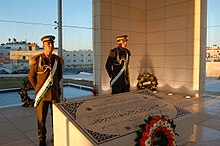
Arafat's tomb inside the mausoleum, guarded by two security guards from the Palestinian Guard of Honour. The mausoleum was also partly funded by EU money. (Ramallah on February 6, 2008)
Questions and Answers
Q: Who was Yasser Arafat?
A: Yasser Arafat was the first leader of the Palestinian people and Chairman of the Palestine Liberation Organization (PLO) from 1969 to 2004. He also became president of the Palestinian National Authority (PNA) in 1993.
Q: Where was he born?
A: Yasser Arafat was born in Jerusalem, Gaza or Cairo.
Q: What did he study at university?
A: Yasser Arafat studied civil engineering at Cairo University.
Q: What did he do for work?
A: He worked as an engineer in Kuwait.
Q: When did he receive a Nobel Peace Prize?
A: In 1994, Yasser Arafat was one of three recipients of the Nobel Peace Prize for their peace efforts in the Middle East when Palestinian National Authority was formed.
Q: How is his legacy viewed by different people?
A: His legacy is viewed differently by different people; some see him as a hero who fought for the cause of the Palestinian people, others see him as a terrorist who promoted violence to reach his goals, and still others think he made too many concessions to Israel's government.
Q: How did he die? A: Yasser died in Paris from a cerebral hemorrhage.
Search within the encyclopedia

